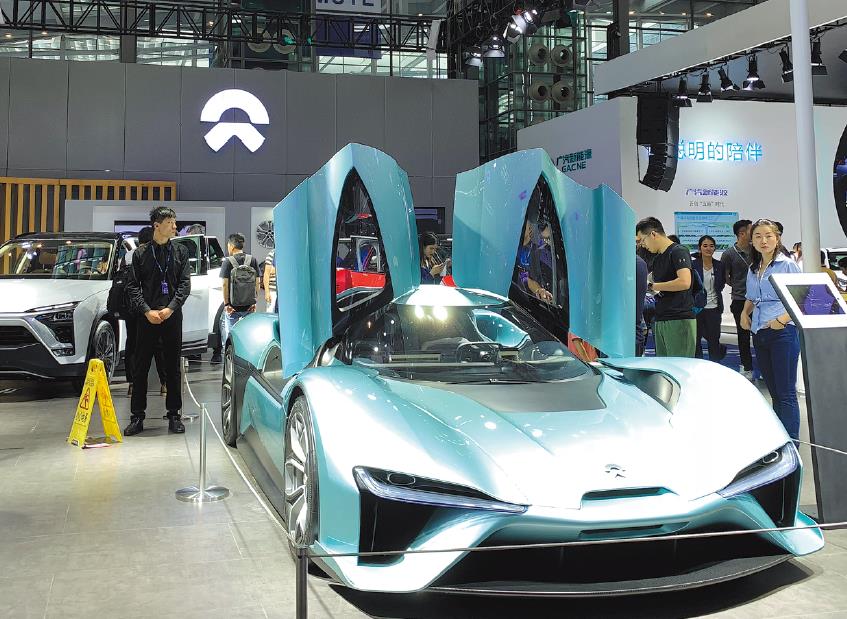Nio hopes to tide over money troubles with new models and customer loyalty


Vehicle sales on the up thanks to renewed confidence in brand and word-of-mouth recommendations from owners
Chinese electric car startup Nio has survived difficult times thanks to growing sales and enviable brand loyalty, but it is still in urgent need of money, said a senior executive.
The company had about $274 million cash on hand at the end of September. But the money is not enough to continue its operations for the next 12 months without external financing, according to a third-quarter financial statement released on Dec 30.
"We are in need of nothing but some money to tide us over," said Qin Lihong, co-founder and president of Nio in an interview a day earlier. The startup held the annual Nio Day in Shenzhen, Guangdong province on Dec 28. Nio car owners showed unbelievable loyalty; the Nio Day was in large part the result of 65 Nio owners' efforts.
Thousands more shouted their support at the event. Outside the venue, more than 100 local car owners volunteered to ferry participants between the city's railway stations, airport and hotels.
Earlier in the year, some Nio car owners funded commercials out of their own pockets for the struggling startup. Others raised 300,000 yuan ($43,062) for a booth to showcase Nio cars at a car show in Macao.
Qin said that Nio sold more than 20,000 vehicles in 2019, with 48 percent sold thanks to customer recommendations.
That brought the accumulative sales of the startup to around 30,000.
"We call ourselves a user company-and users' trust in us is our cornerstone-just like the 100-year brand history for Mercedes and the image of Tesla's science geek boss Elon Musk," said Qin.
He admitted that Nio was on the verge of going broke around the late second quarter and early third.
"Many things conspired against us: the government's subsidy cuts for new energy vehicles, consequent sales fall in the segment and our recall following a car catching fire," he said.
He said the recall was a quick decision and done in a fast way. It cost 700 million yuan and almost became the last straw. But it restored customers' trust and confidence. After that, sales started to recover.
A total of 4,799 cars were delivered in the third quarter, which generated $242.5 million, up 22.5 percent from the second quarter, according to its financial statement.
Nio said it expected more than 8,000 to be delivered in the fourth quarter, which would be a record of quarterly deliveries.
Following the news, its stock prices at Nasdaq hiked more than 50 percent to close at $3.76 on Jan 3 from $2.42 on Dec 27.
But Nio is still losing money. Net loss in the third quarter stood at $352.8 million, but that was down 23.3 percent from the second quarter of 2019.
"Nio remains financially challenged but what we feel now is different as our users show great enthusiasm and our sales grow," said Qin.
Hope lies in the company having a larger lineup. At Nio Day, it unveiled the third production model, the EC6 SUV coupe and an update of its flagship ES8 SUV.
It also showcased the 100-kilowatt-hour battery pack, which is expected to improve the driving range of all its models thanks to its battery-swap technologies.
The EC6 boasts a range of up to 615 kilometers. The model, whose prices will be announced in July and delivered in September, will take on Tesla's Model Y compact crossover, said Qin.
"Actually, our showrooms in several cities have Tesla as neighbors. Statistics show that of the visitors who tried models of both, the chances they choose us is 50-50," said Qin.
At a conference on Dec 30, Nio Chief Financial Officer Feng Wei said that the company has made "significant positive progress" on securing new funds. But he said those projects are still ongoing and declined to disclose any other information.
He said Tencent had loaned the company $100 million-money reflected in its third quarter earnings report.
Nio founder and CEO Li Bin also loaned the company roughly $90 million out of his own pocket as part of that agreement.
Chen Qingtai, president of the industry's leading think tank China EV100, encouraged investors to be farsighted as the automobile industry is asset-heavy.
"You cannot focus too much on short-term gains. Tesla is 16 years old and has been losing money for 16 years in a row. But it is worth around $70 billion in the stock market, higher than GM and Ford," said Chen.
- Nio, Xpeng Motors agree to share charging infrastructure across country
- Year-ender: Names under the spotlight in 2019
- Auto industry pulls out stops to tackle slumping sales
- Chinese EV maker NIO to collaborate with Intel's Mobileye on autonomous vehicles
- Nio to cut more jobs as electric vehicle startup continues to struggle



































